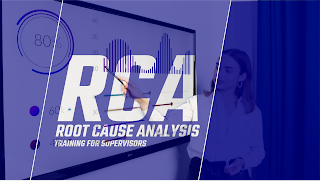What is Root Cause Analysis?
Root Cause Analysis is acronymic as RCA. Unlike other methodologies, root cause analysis (RCA) is in general more successful when there’s a small, focused team involved in looking for answers.
A root cause analysis is an approach, process used to discover the primary source of a problem.
RCA has become a popular methodology for companies stern about resolving issues that negatively impact their bottom line.
A root cause analysis is an approach, process used to discover the primary source of a problem.
RCA has become a popular methodology for companies stern about resolving issues that negatively impact their bottom line.
Why Root Cause Analysis For Supervisors ?
It’s not bizarre to have a supervisor lead an RCA team comprises of communication staff, research staff and personnel from the department or departments being affected by a serious problem.How to Conduct Root Cause Analysis ?
The main goal of RCA is to identify the root cause of the problem. The first and possibly most important step is to identify possible causal factors.The RCA team should set the vision, identify the problem and collect as much data as need to better understand the situation. That data can then be used to identify causal factors.
To recognize the causal factors, be attentive to find out things like:
To recognize the causal factors, be attentive to find out things like:
- What things lead to the problem?
- What situations permit or allow the problem to occur?
- What problems linked with the main problem and affecting it?
Which Industries Are Benefited From Root Cause Analysis?
Several industries like,
- Oil, Gas, Refineries
- Mining, Steel
- Automotive
- Energy
- Manufacturing Plant
- Assembling Manufacturing
- Food and Beverage
- IT (Information Technology)
- Healthcare
- Retail & Customer Service
Tonex Root Cause Analysis Training
Tonex Training offers 2 days Root cause analysis training what provides you the techniques to explore all the potential causes, from human error to tools failure.Tonex RCA techniques will help you study complex problems, and help you effectively to stop them from happening again.
Learning Opportunities
At Tonex RCA training course, you will have learning opportunities like,- Learn about Cognitive interviewing
- Change & Safeguard analysis
- Critical Human Action Profile (CHAP)
- Problem statement & Causes investigation
- Root Cause Identification
- Brainstorming techniques
- Fishbone diagrams
- Fault tree analysis
- 5 “whys”, 8D, Gemba
- Plan, Do, Check, Act (PDCA)
- Pareto analysis
- (Poka Yoke) Mistake proofing
Want To Learn More ?
Visit tonex.com for more information regarding Root Cause Analysis Training for Supervisors.

Comments
Post a Comment